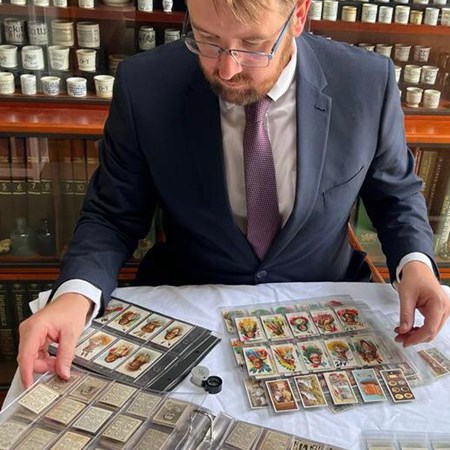Thinking of selling?
Get a free auction estimate by submitting your item online. Selling has never been easier with Griffin’s Auctioneers.
How to Grade Old Coins
Coin grading can be a complex and subjective endeavour, but it's essential for accurately assessing the value of old coins. Although no universally accepted grading system exists, you can follow these general steps to evaluate your old coins. If you'd like to get this process done with expert assistance, consider visiting Griffin's Auctioneers & Valuers Warwick office, or contacting us via email at info@griffinsauctions.co.uk.

Seek Professional Opinions: If you're uncertain about your coin's grade or value, consider obtaining professional assistance. You can visit our Warwick office, where our experts can provide expert grading and evaluation services. Alternatively, you can email us at info@griffinsauctions.co.uk to enquire about our services and schedule an appointment.
Record and Document: Maintain a record of your coin's grade, accompanied by clear photographs. This documentation is essential if you plan to sell or insure your coin collection.
Remember that coin grading requires practice and experience to become proficient. Be patient and continue learning as you assess more coins over time. If you are passionate about coin collecting, consider joining a local coin club or attending coin shows to gain insights and expertise from fellow collectors and dealers.
Smart Collecting: How to Avoid Overpaying for Old Coins
Collecting old coins can be an exciting and rewarding hobby, but it's essential to be vigilant and informed to avoid overpaying for these precious artifacts. Whether you're a seasoned collector or just starting, understanding the factors that influence coin prices and adopting smart collecting practices can save you from overspending. In this article, we'll explore some strategies to ensure you never overpay for old coins.
Collecting old coins is a captivating pursuit, but it requires diligence and knowledge to avoid overpaying. By educating yourself, setting a budget, using grading standards, buying from reputable sources, attending coin shows, verifying authenticity, monitoring market trends, and seeking expert opinions, you can make informed decisions and build a valuable coin collection without breaking the bank. Remember that patience and careful consideration are the keys to successful coin collecting.
When in Doubt, Consult a Professional
Learning to assess the value of old coins on your own is certainly possible, but it's crucial to understand that achieving a high level of accuracy in grading coins typically requires years of hands-on experience.
In our extensive involvement in the field, we've noticed that many collectors often tend to overestimate the condition of their coins. This underscores the importance of approaching coin evaluation with a degree of caution and a vigilant eye.
In practice, staying up to date with current coin valuations often necessitates active engagement in the buying and selling of coins, a practice that mirrors what we do at Griffin's Auctioneers & Valuers. This active involvement allows us to stay attuned to evolving trends in coin collecting and their direct impact on the actual selling prices of coins.
Remember, the value of a coin ultimately hinges on what a willing buyer is prepared to pay for it. In cases where two ardent collectors’ express interest in the same coin, it can lead to a noteworthy increase in its market price. To delve deeper into the world of coin valuations or to seek professional assistance, don't hesitate to reach out to us here at Griffin's Auctioneers & Valuers.
You can contact us by calling 01926 505012 or sending an email to info@griffinsauctions.co.uk.
Get a free auction estimate by submitting your item online. Selling has never been easier with Griffin’s Auctioneers.
